formerly eScholarship Editions


|
|
|
|
Your search for
'German Studies' in subject
found 36 book(s). | Modify Search | Displaying 21 - 36 of 36 book(s) | |
| 21. | 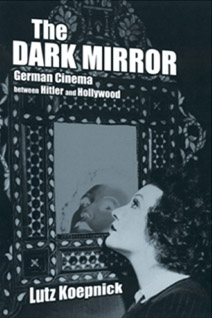 | Title: The dark mirror: German cinema between Hitler and Hollywood Author: Koepnick, Lutz P. (Lutz Peter) Published: University of California Press, 2002 Subjects: Cinema and Performance Arts | German Studies | Music | Film Publisher's Description: Lutz Koepnick analyzes the complicated relationship between two cinemas - Hollywood's and Nazi Germany's - in this theoretically and politically incisive study. The Dark Mirror examines the split course of German popular film from the early 1930s until the mid 1950s, showing how Nazi filmmakers appropriated Hollywood conventions and how German film exiles reworked German cultural material in their efforts to find a working base in the Hollywood studio system. Through detailed readings of specific films, Koepnick provides a vivid sense of the give and take between German and American cinema. [brief] Similar Items |
| 22. | 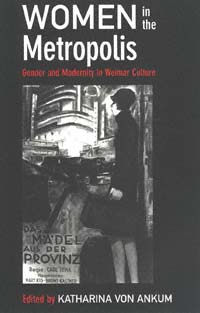 | Title: Women in the metropolis: gender and modernity in Weimar culture Author: Ankum, Katharina von Published: University of California Press, 1997 Subjects: German Studies | Women's Studies | European Literature | Film | European History Publisher's Description: Bringing together the work of scholars in many disciplines, Women in the Metropolis provides a comprehensive introduction to women's experience of modernism and urbanization in Weimar Germany. It shows women as active participants in artistic, social, and political movements and documents the wide range of their responses to the multifaceted urban culture of Berlin in the 1920s and 1930s.Examining a variety of media ranging from scientific writings to literature and the visual arts, the authors trace gendered discourses as they developed to make sense of and regulate emerging new images of femininity. Besides treating classic films such as Metropolis and Berlin: Symphony of a Great City , the articles discuss other forms of mass culture, including the fashion industry and the revue performances of Josephine Baker. Their emphasis on women's critical involvement in the construction of their own modernity illustrates the significance of the Weimar cultural experience and its relevance to contemporary gender, German, film, and cultural studies. [brief] Similar Items |
| 23. | 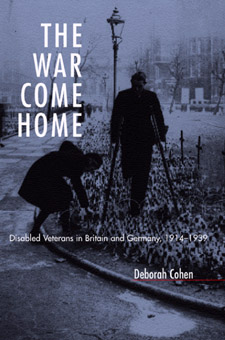 | Title: The war come home: disabled veterans in Britain and Germany, 1914-1939 Author: Cohen, Deborah 1968- Published: University of California Press, 2001 Subjects: History | European History | German Studies | Military History | European Studies Publisher's Description: Disabled veterans were the First World War's most conspicuous legacy. Nearly eight million men in Europe returned from the First World War permanently disabled by injury or disease. In The War Come Home, Deborah Cohen offers a comparative analysis of the very different ways in which two belligerent nations--Germany and Britain--cared for their disabled. At the heart of this book is an apparent paradox. Although postwar Germany provided its disabled veterans with generous benefits, they came to despise the state that favored them. Disabled men proved susceptible to the Nazi cause. By contrast, British ex-servicemen remained loyal subjects, though they received only meager material compensation. Cohen explores the meaning of this paradox by focusing on the interplay between state agencies and private philanthropies on one hand, and the evolving relationship between disabled men and the general public on the other. Written with verve and compassion, The War Come Home describes in affecting detail disabled veterans' lives and their treatment at the hands of government agencies and private charities in Britain and Germany. Cohen's study moves from the intimate confines of veterans' homes to the offices of high-level bureaucrats; she tells of veterans' protests, of disabled men's families, and of the well-heeled philanthropists who made a cause of the war's victims. This superbly researched book provides an important new perspective on the ways in which states and societies confront the consequences of industrialized warfare. [brief] Similar Items |
| 24. | 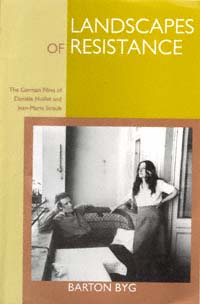 | Title: Landscapes of resistance: the German films of Danièle Huillet and Jean-Marie Straub Author: Byg, Barton 1953- Published: University of California Press, 1995 Subjects: Cinema and Performance Arts | Film | German Studies | Intellectual History Publisher's Description: Fervently admired and frequently reviled, Jean-Marie Straub and Danièle Huillet - who have lived and worked together for almost forty years - may well be the most uncompromising, not to say intransigent, filmmakers in the history of the medium. Their radical and deeply political films placed them as forerunners of the New German Cinema movement in the 1960s and influential figures in the subsequent explosion of the European avant-garde. In Landscapes of Resistance , Barton Byg fills a significant gap in modern German and European cinema studies by tracing the career of the two filmmakers and exploring their connection to German modernism, in particular their relationship to the Frankfurt School.Although they are not German themselves, Straub and Huillet have used German material as the basis for the majority of their films. They have transcribed prose by Böll and Kafka, operas by Schoenberg, and verse dramas by Holderlin. Byg explores how their work engages German culture with a critical distance and affection and confronts the artificiality of divisions between high and low culture. [brief] Similar Items |
| 25. | 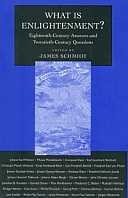 | Title: What is Enlightenment?: eighteenth-century answers and twentieth-century questions Author: Schmidt, James Published: University of California Press, 1996 Subjects: Philosophy | Social and Political Thought | Intellectual History | German Studies Publisher's Description: This collection contains the first English translations of a group of important eighteenth-century German essays that address the question, "What is Enlightenment?" The book also includes newly translated and newly written interpretive essays by leading historians and philosophers, which examine the origins of eighteenth-century debate on Enlightenment and explore its significance for the present.In recent years, critics from across the political and philosophical spectrum have condemned the Enlightenment for its complicity with any number of present-day social and cultural maladies. It has rarely been noticed, however, that at the end of the Enlightenment, German thinkers had already begun a scrutiny of their age so wide-ranging that there are few subsequent criticisms that had not been considered by the close of the eighteenth century. Among the concerns these essays address are the importance of freedom of expression, the relationship between faith and reason, and the responsibility of the Enlightenment for revolutions.Included are translations of works by such well-known figures as Immanuel Kant, Moses Mendelssohn, Johann Gottlieb Fichte, and Johann Georg Hamann, as well as essays by thinkers whose work is virtually unknown to American readers. These eighteenth-century texts are set against interpretive essays by such major twentieth-century figures as Max Horkheimer, Jürgen Habermas, and Michel Foucault. [brief] Similar Items |
| 26. | 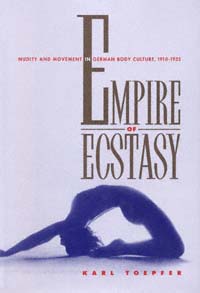 | Title: Empire of ecstasy: nudity and movement in German body culture, 1910-1935 Author: Toepfer, Karl Eric 1948- Published: University of California Press, 1997 Subjects: Cinema and Performance Arts | German Studies | Gender Studies | Dance Publisher's Description: Empire of Ecstasy offers a novel interpretation of the explosion of German body culture between the two wars - nudism and nude dancing, gymnastics and dance training, dance photography and criticism, and diverse genres of performance from solo dancing to mass movement choirs. Karl Toepfer presents this dynamic subject as a vital and historically unique construction of "modern identity." The modern body, radiating freedom and power, appeared to Weimar artists and intelligentsia to be the source of a transgressive energy, as well as the sign and manifestation of powerful, mysterious "inner" conditions. Toepfer shows how this view of the modern body sought to extend the aesthetic experience beyond the boundaries imposed by rationalized life and to transcend these limits in search of ecstasy. With the help of much unpublished or long-forgotten archival material (including many little-known photographs), he investigates the process of constructing an "empire" of appropriative impulses toward ecstasy. Toepfer presents the work of such well-known figures as Rudolf Laban, Mary Wigman, and Oskar Schlemmer, along with less-known but equally fascinating body culture practitioners. His book is certain to become required reading for historians of dance, body culture, and modernism. [brief] Similar Items |
| 27. | 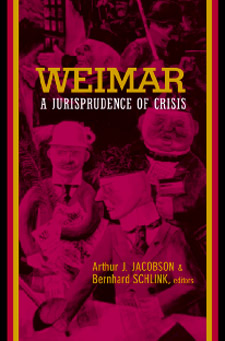 | Title: Weimar: a jurisprudence of crisis Author: Jacobson, Arthur J Published: University of California Press, 2001 Subjects: Law | Social and Political Thought | German Studies | Political Theory Publisher's Description: This selection of the major works of constitutional theory during the Weimar period reflects the reactions of legal scholars to a state in permanent crisis, a society in which all bets were off. Yet the Weimar Republic's brief experiment in constitutionalism laid the groundwork for the postwar Federal Republic, and today its lessons can be of use to states throughout the world. Weimar legal theory is a key to understanding the experience of nations turning from traditional, religious, or command-and-control forms of legitimation to the rule of law. Only two of these authors, Hans Kelsen and Carl Schmitt, have been published to any extent in English, but they and the others whose writings are translated here played key roles in the political and constitutional struggles of the Weimar Republic. Critical introductions to all the theorists and commentaries on their works have been provided by experts from Austria, Canada, Germany, and the United States. In their general introduction, the editors place the Weimar debate in the context of the history and politics of the Weimar Republic and the struggle for constitutionalism in Germany. This critical scrutiny of the Weimar jurisprudence of crisis offers an invaluable overview of the perils and promise of constitutional development in states that lack an entrenched tradition of constitutionalism. [brief] Similar Items |
| 28. | 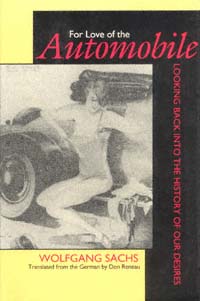 | Title: For love of the automobile: looking back into the history of our desires Author: Sachs, Wolfgang Published: University of California Press, 1992 Subjects: Science | European History | Technology and Society | German Studies Publisher's Description: In his cultural analysis of the motor car in Germany, Wolfgang Sachs starts from the assumption that the automobile is more than a means of transportation and that its history cannot be understood merely as a triumphant march of technological innovation. Instead, Sachs examines the history of the automobile from the late 1880s until today for evidence on the nature of dreams and desires embedded in modern culture. Written in a lively style and illustrated by a wealth of cartoons, advertisements, newspaper stories, and propaganda, this book explores the nature of Germany's love affair with the automobile. A "history of our desires" for speed, wealth, violence, glamour, progress, and power - as refracted through images of the automobile - it is at once fascinating and provocative.Sachs recounts the development of the automobile industry and the impact on German society of the marketing and promotion of the motor car. As cars became more affordable and more common after World War II, advertisers fanned the competition for status, refining their techniques as ownership became ever more widespread.Sachs concludes by demonstrating that the triumphal procession of private motorization has in fact become an intrusion. The grand dreams once attached to the automobile have aged. Sachs appeals for the cultivation of new dreams born of the futility of the old ones, dreams of "a society liberated from progress," in which location, distance, and speed are reconceived in more appropriately humane dimensions. [brief] Similar Items |
| 29. |  | Title: Where the world ended: re-unification and identity in the German borderland Author: Berdahl, Daphne 1964- Published: University of California Press, 1999 Subjects: Anthropology | Cultural Anthropology | German Studies | Geography | European Studies | Social Problems Publisher's Description: When the Berlin Wall fell, people who lived along the dismantled border found their lives drastically and rapidly transformed. Daphne Berdahl, through ongoing ethnographic research in a former East German border village, explores the issues of borders and borderland identities that have accompanied the many transitions since 1990. What happens to identity and personhood, she asks, when a political and economic system collapses overnight? How do people negotiate and manipulate a liminal condition created by the disappearance of a significant frame of reference?Berdahl concentrates especially on how these changes have affected certain "border zones" of daily life - including social organization, gender, religion, and nationality - in a place where literal, indeed concrete, borders were until recently a very powerful presence. Borders, she argues, are places of ambiguity as well as of intense lucidity; these qualities may in fact be mutually constitutive. She shows how, in a moment of headlong historical transformation, larger political, economic, and social processes are manifested locally and specifically. In the process of a transition between two German states, people have invented, and to some extent ritualized, cultural practices that both reflect and constitute profound identity transformations in a period of intense social discord. Where the World Ended combines a vivid ethnographic account of everyday life under socialist rule and after German reunification with an original investigation of the paradoxical human condition of a borderland. [brief] Similar Items |
| 30. | 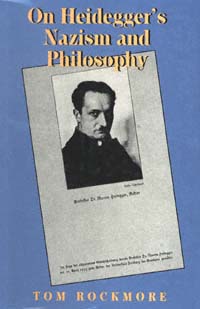 | Title: On Heidegger's Nazism and philosophy Author: Rockmore, Tom 1942- Published: University of California Press, 1991 Subjects: Philosophy | Social and Political Thought | German Studies | Intellectual History Publisher's Description: That Martin Heidegger supported National Socialism has long been common knowledge. Yet the relation between his philosophy and political commitments remains highly contentious and recently has erupted into a vociferous debate. Boldly refuting arguments that the philosopher's political stance was accidental or adopted under coercion, Rockmore argues that Heidegger's philosophical thought and his Nazism are inseparably intertwined, that he turned to National Socialism on the basis of his philosophy, and that his later evolution is largely determined by his continuing concern with Nazism.After developing a framework that clearly outlines the interrelation of Nazism and Heidegger's philosophy, Rockmore analyzes the famous rectoral address the philosopher delivered in 1933 upon becoming rector of the University of Freiburg. In that speech Heidegger sought to ground politics in philosophy. Rockmore examines the inseparable relation of politics and philosophy in Heidegger's Being and Time , the recently published Contributions to Philosophy (written from 1936 to 1938), and the interpretations of Hölderlin, Nietzsche, and technology.In his conclusion Rockmore considers the ongoing discussion of Heidegger's thought and Nazism in France. Combining extensive documentation of the Heidegger controversy with philosophical and historical analysis, this book raises profound questions about the social and political responsibility of philosophy. [brief] Similar Items |
| 31. | 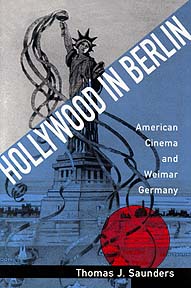 | Title: Hollywood in Berlin: American cinema and Weimar Germany Author: Saunders, Thomas J Published: University of California Press, 1994 Subjects: Cinema and Performance Arts | German Studies | Film | United States History | European History Publisher's Description: The setting is 1920s Berlin, cultural heart of Europe and the era's only serious cinematic rival to Hollywood. In his engaging study, Thomas Saunders explores an outstanding example of one of the most important cultural developments of this century: global Americanization through the motion picture.The invasion of Germany by American films, which began in 1921 with overlapping waves of sensationalist serials, slapstick shorts, society pictures, and historical epics, initiated a decade of cultural collision and accommodation. On the one hand it fueled an impassioned debate about the properties of cinema and the specter of wholesale Americanization. On the other hand it spawned unprecedented levels of cooperation and exchange.In Berlin, American motion pictures not only entertained all social classes and film tastes but also served as a vehicle for American values and a source of sharp economic competition. Hollywood in Berlin correlates the changing forms of Hollywood's contributions to Weimar culture and the discourses that framed and interpreted them, restoring historical contours to a leading aspect of cultural interchange in this century. At the same time, the book successfully embeds Weimar cinema in its contemporary international setting. [brief] Similar Items |
| 32. | 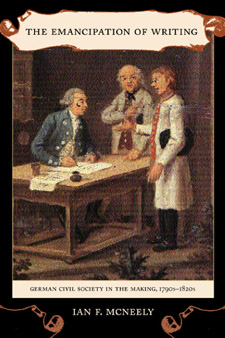 | Title: The emancipation of writing: German civil society in the making, 1790s-1820s Author: McNeely, Ian F 1971- Published: University of California Press, 2003 Subjects: History | European Studies | German Studies | European History | Sociology | Political Theory | Anthropology Publisher's Description: The Emancipation of Writing is the first study of writing in its connection to bureaucracy, citizenship, and the state in Germany. Stitching together micro- and macro-level analysis, it reconstructs the vibrant, textually saturated civic culture of the German southwest in the aftermath of the French Revolution and Napoleon's invasions. Ian F. McNeely reveals that Germany's notoriously oppressive bureaucracy, when viewed through the writing practices that were its lifeblood, could also function as a site of citizenship. Citizens, acting under the mediation of powerful local scribes, practiced their freedoms in written engagements with the state. Their communications laid the basis for civil society, showing how social networks commonly associated with the free market, the free press, and the voluntary association could also take root in powerful state institutions. [brief] Similar Items |
| 33. | 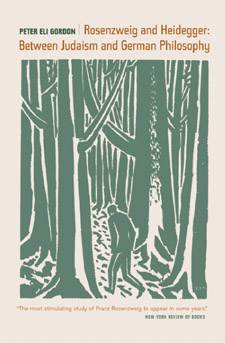 | Title: Rosenzweig and Heidegger: between Judaism and German philosophy Author: Gordon, Peter Eli Published: University of California Press, 2003 Subjects: History | German Studies | Religion | Judaism | European History | Intellectual History | Jewish Studies | Social and Political Thought Publisher's Description: Franz Rosenzweig (1886-1929) is widely regarded today as one of the most original and intellectually challenging figures within the so-called renaissance of German-Jewish thought in the Weimar period. The architect of a unique kind of existential theology, and an important influence upon such philosophers as Walter Benjamin, Martin Buber, Leo Strauss, and Emmanuel Levinas, Rosenzweig is remembered chiefly as a "Jewish thinker," often to the neglect of his broader philosophical concerns. Cutting across the artificial divide that the traumatic memory of National Socialism has drawn between German and Jewish philosophy, this book seeks to restore Rosenzweig's thought to the German philosophical horizon in which it first took shape. It is the first English-language study to explore Rosenzweig's enduring debt to Hegel's political theory, neo-Kantianism, and life-philosophy; the book also provides a new, systematic reading of Rosenzweig's major work, The Star of Redemption. Most of all, the book sets out to explore a surprising but deep affinity between Rosenzweig's thought and that of his contemporary, the German philosopher Martin Heidegger. Resisting both apologetics and condemnation, Gordon suggests that Heidegger's engagement with Nazism should not obscure the profound and intellectually compelling bond in the once-shared tradition of modern German and Jewish thought. A remarkably lucid discussion of two notably difficult thinkers, this book represents an eloquent attempt to bridge the forced distinction between modern Jewish thought and the history of modern German philosophy - and to show that such a distinction cannot be sustained without doing violence to both. [brief] Similar Items |
| 34. | 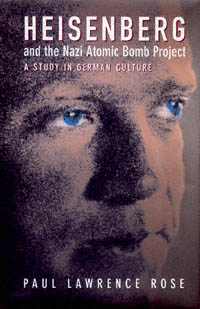 | Title: Heisenberg and the Nazi atomic bomb project: a study in German culture Author: Rose, Paul Lawrence Published: University of California Press, 1998 Subjects: History | European History | German Studies | European Studies | Science | Technology and Society | Physics | History and Philosophy of Science Publisher's Description: No one better represents the plight and the conduct of German intellectuals under Hitler than Werner Heisenberg, whose task it was to build an atomic bomb for Nazi Germany. The controversy surrounding Heisenberg still rages, because of the nature of his work and the regime for which it was undertaken. What precisely did Heisenberg know about the physics of the atomic bomb? How deep was his loyalty to the German government during the Third Reich? Assuming that he had been able to build a bomb, would he have been willing? These questions, the moral and the scientific, are answered by Paul Lawrence Rose with greater accuracy and breadth of documentation than any other historian has yet achieved.Digging deep into the archival record among formerly secret technical reports, Rose establishes that Heisenberg never overcame certain misconceptions about nuclear fission, and as a result the German leaders never pushed for atomic weapons. In fact, Heisenberg never had to face the moral problem of whether he should design a bomb for the Nazi regime. Only when he and his colleagues were interned in England and heard about Hiroshima did Heisenberg realize that his calculations were wrong. He began at once to construct an image of himself as a "pure" scientist who could have built a bomb but chose to work on reactor design instead. This was fiction, as Rose demonstrates: in reality, Heisenberg blindly supported and justified the cause of German victory. The question of why he did, and why he misrepresented himself afterwards, is answered through Rose's subtle analysis of German mentality and the scientists' problems of delusion and self-delusion. This fascinating study is a profound effort to understand one of the twentieth century's great enigmas. [brief] Similar Items |
| 35. |  | Title: Jazz, rock, and rebels: cold war politics and American culture in a divided Germany Author: Poiger, Uta G 1965- Published: University of California Press, 2000 Subjects: German Studies | Cultural Anthropology | European History | United States History | American Music | Jazz | Gender Studies | American Studies Publisher's Description: In the two decades after World War II, Germans on both sides of the iron curtain fought vehemently over American cultural imports. Uta G. Poiger traces how westerns, jeans, jazz, rock 'n' roll, and stars like Marlon Brando or Elvis Presley reached adolescents in both Germanies, who eagerly adopted the new styles. Poiger reveals that East and West German authorities deployed gender and racial norms to contain Americanized youth cultures in their own territories and to carry on the ideological Cold War battle with each other. Poiger's lively account is based on an impressive array of sources, ranging from films, newspapers, and contemporary sociological studies, to German and U.S. archival materials. Jazz, Rock, and Rebels examines diverging responses to American culture in East and West Germany by linking these to changes in social science research, political cultures, state institutions, and international alliance systems. In the first two decades of the Cold War, consumer culture became a way to delineate the boundaries between East and West. This pathbreaking study, the first comparative cultural history of the two Germanies, sheds new light on the legacy of Weimar and National Socialism, on gender and race relations in Europe, and on Americanization and the Cold War. [brief] Similar Items |
| 36. | 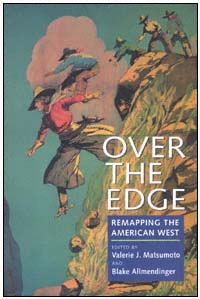 | Title: Over the edge: remapping the American West Author: Matsumoto, Valerie J Published: University of California Press, 1999 Subjects: American Studies | California and the West | Popular Culture | History | United States History | Californian and Western History | German Studies Publisher's Description: From the Gold Rush to rush hour, the history of the American West is fraught with diverse, subversive, and at times downright eccentric elements. This provocative volume challenges traditional readings of western history and literature, and redraws the boundaries of the American West with absorbing essays ranging widely on topics from tourism to immigration, from environmental battles to interethnic relations, and from law to film. Taken together, the essays reassess the contributions of a diverse and multicultural America to the West, as they link western issues to global frontiers.Featuring the latest work by some of the best new writers both inside and outside academia, the original essays in Over the Edge confront the traditional field of western American studies with a series of radical, speculative, and sometimes outrageous challenges. The collection reads the West through Ben-Hur and the films of Mae West; revises the western American literary canon to include the works of African American and Mexican American writers; examines the implications of miscegenation law and American Indian blood quantum requirements; and brings attention to the historical participation of Mexican and Japanese American women, Native American slaves, and Alaskan cannery workers in community life. [brief] Similar Items |